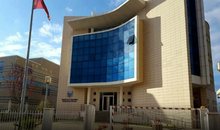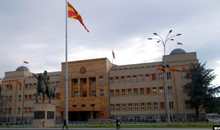
IMF: Albania can increase income by 9% of GDP by 2030 by fighting corruption

Developing countries, where Albania is also classified, can increase budget revenues by 9% of GDP by 2030, if they implement some reforms related to the reduction of corruption, the fight against informality, the implementation of reforms and strengthening of institutions says an IMF study "Countries can use the tax potential to finance development objectives".
"Since 1990, some countries have been extremely successful in increasing incomes, such as Albania, Argentina, Armenia, Brazil, Colombia and Georgia, which all mobilized more than 5 percentage points of GDP, but this growth happened before the global financial crisis of 2008. After that, progress has been difficult and fragile", refer the experts of the Fund.
Budget revenues in value in our country have increased, but they have not improved the ratio to GDP since 2008. According to official data from the Ministry of Finance, in 2022 budget revenues reached 26.8% of GDP in lower level than in 2008 where the indicator was 28.9% of GDP.
IMF experts reveal that developing countries, including Albania, have the potential to increase their tax ratios to GDP by up to 9 percentage points through tax reform and strengthening of public institutions. The new tax-free space can provide our country with sufficient financial resources to achieve the objectives of sustainable development until 20230.
Harnessing this potential would also contribute to financial development and private sector entrepreneurship.
The average tax-to-GDP ratio in emerging markets has risen by about 3 to 5 percentage points since the early 1990s, driven largely by consumption taxes such as value added and excise taxes.
Furthermore, progress in income growth since the early 1990s has varied greatly across countries. Half of emerging market economies and two-thirds of low-income countries had a tax-to-GDP ratio in 2020 that was lower than 15 percent – a tipping point above which growth is found to be accelerated.
The improvement of public institutions in the developing economies of which Albania is a part, including the reduction of corruption, would result in an additional increase of 5 percentage points of income in relation to GDP.
To build tax capacity, governments will need to implement comprehensive institutional reforms, which focus on domestic fiscal policy.
The IMF suggests as a fundamental intervention the improvement, design and administration of taxes such as VAT, excise duties, personal income taxes and corporate income taxes.
Also the implementation of bold reform plans in broadening the tax base through more neutral taxation of capital income and better use of property taxes would be a possibility.
Improving the institutions that run the tax system and manage tax reform is considered another key element. This requires adequate staff to predict and analyze the impact of tax policies on the economy, high professionalization of public officials working on the design and implementation of fiscal policy and better use of digital technologies further suggests the IMF study./ Monitor
Latest news






Marrëdhënia që s’është romancë, por s’është as thjesht kolegiale
2025-07-07 21:39:13
Citizen is asked to pay 2.5 million for a non-existent meter
2025-07-07 21:28:03




What is the ideal air conditioner temperature in summer?
2025-07-07 20:53:46
GJKKO left him in prison, Meta appeals the decision
2025-07-07 20:38:05
Where is Ronaldo after missing Diogo Jota's funeral?
2025-07-07 20:38:04

Messages from the author who killed Ilaria Sulla in Rome are revealed
2025-07-07 20:20:12
At least 91 dead in Texas floods
2025-07-07 20:12:02
Elbasan, choked by smoke, scorched by conscience
2025-07-07 19:48:16

Swarm of bees attacks citizens in France, 24 people end up in hospital
2025-07-07 19:32:03
Dementia/Hearing loss may be a warning sign
2025-07-07 19:13:06
The decision for Malltez, Gjokutaj: Boomerang for SPAK and the Court
2025-07-07 19:01:08

Former Supreme Court member acquitted of asset concealment
2025-07-07 18:36:40

WIIW expert in Politiko: Brain drain is steadily weakening the Albanian economy
2025-07-07 18:11:41
Heart health is at risk from extreme heat, here's what you should be careful of
2025-07-07 18:10:18
Today Gert Bogdani would celebrate, Edlira Çepani's touching dedication
2025-07-07 17:40:45






The striker severely accuses the Fenerbahce club: They tried to drug me
2025-07-07 16:21:03
A decomposed body is found in Kolonjë, initial suspicions
2025-07-07 16:03:31
Accident in Saranda, car hits motorcycle, one injured
2025-07-07 15:58:56

The most fertile age for men and women
2025-07-07 15:40:52
Locals, Rama candidate in 5 municipalities
2025-07-07 15:32:22
Blushi: Meta's criminal kidnapping, incomparable even to Navalny's in Russia
2025-07-07 15:20:34
Meet the iPhone 17 Pro, the main innovations in design and technology
2025-07-07 15:09:09
Why the release of Abi Malltez does not free him; much less Albania
2025-07-07 15:00:12
‘Lidhjet klienteliste’ të mjekëve mbushin recetat e pacientëve
2025-07-07 14:57:33
Poland imposes border controls with Germany and Lithuania
2025-07-07 14:48:15

Caught transporting firearms from Kosovo to Albania, young man arrested (NAME)
2025-07-07 14:37:47
Theo Hernandez flies to Saudi Arabia for medical check-ups
2025-07-07 14:26:47


Scorching heat, Greece orders mandatory work holidays
2025-07-07 13:54:25




Trump expects Netanyahu to discuss Gaza ceasefire
2025-07-07 12:54:27

GJKKO releases Jamarbër Malltezi from house arrest
2025-07-07 12:35:02
Tourism among contrasts
2025-07-07 12:31:01
IKMT action in Theth, starts demolition of unauthorized constructions
2025-07-07 12:24:18

The Tirana-Kamëz line is destroyed by urban fire
2025-07-07 12:00:24




Poor direction!
2025-07-07 11:16:01


Rama to gather the country's mayors on July 9
2025-07-07 10:43:31

Ohrid Natural Park on the way to UNESCO's "black list"
2025-07-07 10:25:58

Registrations for the new school year begin in e-Albania
2025-07-07 09:59:09
KAS decides the "fate" of the elections in four districts of the country today
2025-07-07 09:50:51
Rama does not give up on Vlora, visits the municipality again
2025-07-07 09:39:11


Fires in Gjirokastra, flames very close to cultural monuments
2025-07-07 09:12:49

Foreign exchange, the rate at which foreign currencies are sold and bought
2025-07-07 08:39:57

Horoscope, what do the stars have in store for you today?
2025-07-07 08:14:17
The week starts with scorching temperatures, the thermometer reaches 37°C
2025-07-07 07:58:36
Morning Post/ In 2 lines: What mattered yesterday in Albania
2025-07-07 07:45:15



Theologian: Behind Rama's idea for a Bektashi state in Albania, Israel is hiding
2025-07-06 20:57:48
Rama's rhetoric without standards, comparing Paris, London, New York with Vlora
2025-07-06 20:35:52
Vehicle goes off the road, driver dies in Kukës
2025-07-06 20:07:47
What is the possible agreement on the Gaza hostages and the ceasefire?
2025-07-06 19:47:09


Massive hiring in the Macedonian administration ahead of the elections
2025-07-06 18:37:19

Texas tragedy: 59 dead and 27 girls still missing after devastating floods
2025-07-06 17:48:24
Albania for sale and purchase by Jared Kushner
2025-07-06 17:17:37
Kurti reacts to bomb threat in Parliament: Active hybrid war from Serbia
2025-07-06 16:55:59
